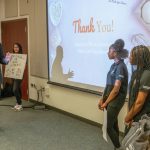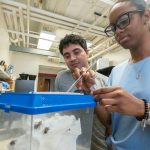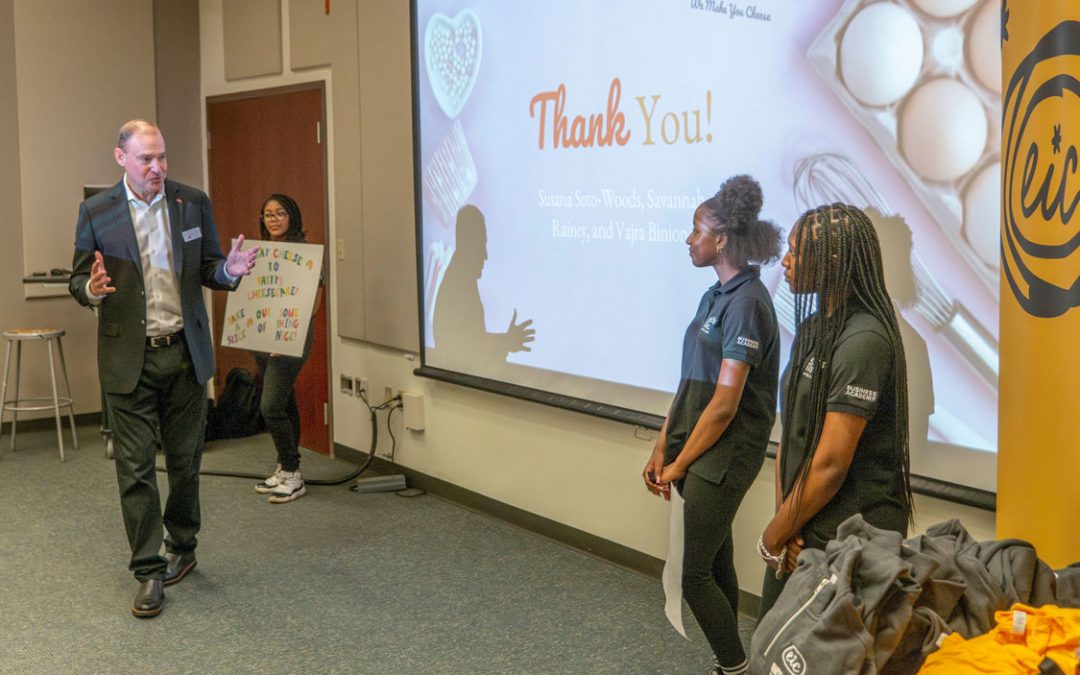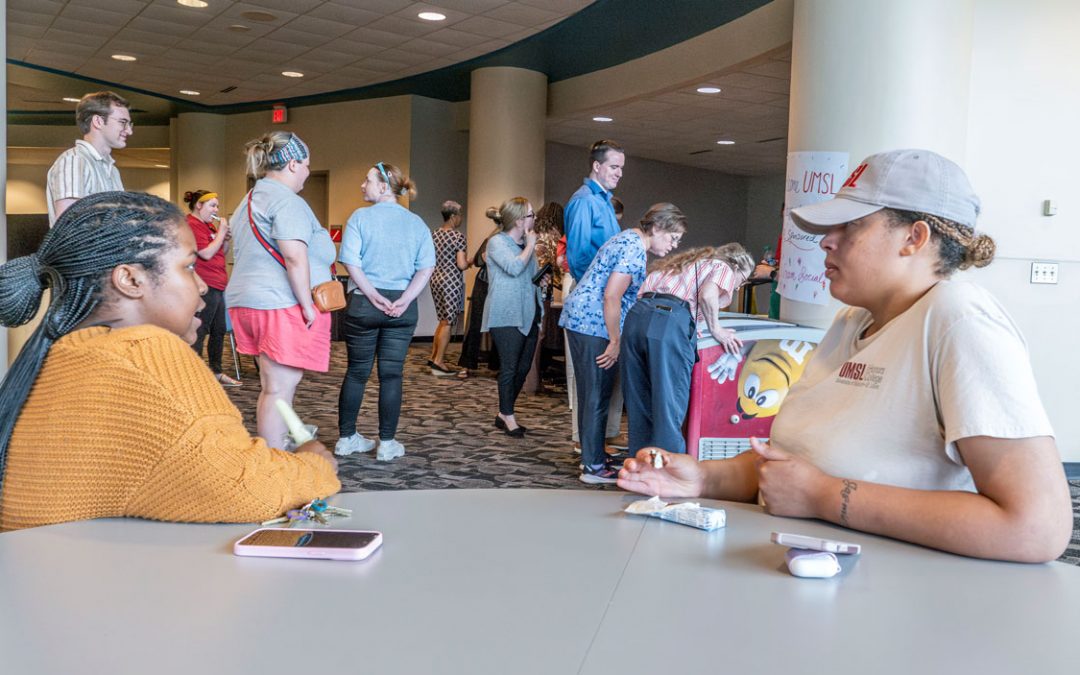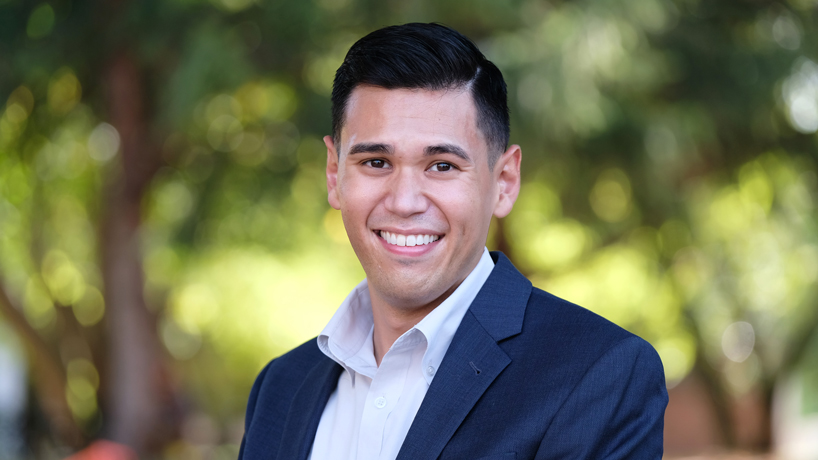
Now two months into his new position – first proposed to campus administrators by UMSL students – Harry Hawkins hopes to strengthen existing initiatives that help make the university community a safe, welcoming space as well as foster some new ones. (Photo by August Jennewein)
Ask Harry Hawkins’ new supervisors at the University of Missouri–St. Louis why they are so excited to have him on campus, and they’re quick to reference what he was doing just before he got here – on behalf of the Human Rights Campaign.
For the past several years, as one of the civil rights organization’s few field directors based in the South, Hawkins was at the forefront of the push for LGBTQ equality in his home state of Mississippi.
Now he’s applying his expertise at UMSL as the university’s first-ever diversity and LGBTQ+ program and project support coordinator. He stepped into the position in July and is already collaborating closely with colleagues in the Office of Diversity, Equity and Inclusion and the Office of Sexuality and Gender Diversity – plus students involved in PRIZM, the queer-trans-straight alliance on campus.
But it wasn’t so long ago that Hawkins was content to sit back and let others take the lead on some of the issues that matter to him most.
His freshman year at Mississippi State University, where he would go on to earn a graduate degree in clinical mental health counseling, stands out as a turning point. Mostly in the closet at the time, he started to get involved with Spectrum, MSU’s gay-straight alliance.
“I would go to the meetings and think, ‘We have people who are out and proud, pushing for things on campus. And you know, let’s let those folks – and the Human Rights Campaign and the ACLU and GLAAD – let’s let all of them make the ruckus and push for stuff, and I’ll just be an armchair activist and reap the benefits,’” Hawkins recalls.
Even as he remained less than exuberant about the nitty-gritty work of advocating for change, he felt inspired by what other students were doing – particularly one of them, whom Hawkins describes as happy and buoyant and unafraid.
“I remember thinking, ‘I hope I can be that person one day,’” Hawkins says. “He was just the life of our group.”
Over spring break that year, Hawkins got a phone call with horrible news: That friend, someone he’d looked up to, was dead.
“He had been beaten to death in Memphis – it was a hate crime – for being gay,” Hawkins explains. “And that moment really changed my thinking, because I said, ‘People are dying for being who they are. This is a thing. I can’t just sit back and be quiet when people are dying.’ And so I really jumped in at that point.
“That really pushes me to do this work. We have to protect people who are just living, just being who they are. And as far as bringing that into UMSL, we have to ensure that our students are thriving. Their job is to come here, learn, meet new people, expand their minds, get that degree and then go out in the world and do great things. They need to focus on that. We don’t want them worrying about whether they’re going to be discriminated against or anything like that.”
Hawkins notes that while much has changed for the better in the decade since he was an undergraduate, there’s still work to do in terms of making campus environments as open and welcoming as they can be.
As a southerner, he thinks about the recruitment and retention of LGBTQ students, faculty and staff much like he does hospitality.
“We need to welcome folks here and keep them here,” Hawkins says. “Because we know that if you don’t feel welcome somewhere, and you don’t feel like you are validated holistically as a person, you’re not going to stay there.”
At UMSL, one key issue he hopes to address is communication. He’s impressed with “a lot of great programs, a lot of great initiatives” taking place but sees a need for a more streamlined, collaborative approach to the work being done.
Toward that end, he’s currently working to reconvene UMSL’s Students with Disabilities group and the LGBTQ Advisory Board. A call for applicants for the latter that he sent out at the start of the school year has already generated over 80 eager responses, many of them from students.
That early success isn’t surprising to Associate Teaching Professor Kathleen Nigro, director of the Gender Studies program and the Office of Sexuality and Gender Diversity. She says his ability to act as a liaison among all departments and units on campus is key.
“Being that vehicle for communication is one of Harry’s skills, and he has the experience to work with people who resist change as well,” Nigro says. “He’s already proving to be proactive – he has awareness of a need and acts on it. His vision for UMSL is that we be the leader in diversity. And we will be, because that is the only equitable solution to social imbalance.”
Deborah Burris, chief diversity officer for the university, echoes this confidence in the role that Hawkins can play.
She sees him as instrumental in advancing diversity on the campus and ensuring that UMSL is a welcoming living, learning and working environment for everyone. It’s part of a renewed commitment across the entire University of Missouri System as it seeks to serve diverse populations – the LGBTQ community, minorities, women, people with disabilities and others.
“Staffing becomes critically important to implement effective diversity strategies at the campus level,” Burris says. “This position is part of building the infrastructure to support diversity administration.”
Along with reinvigorating and guiding UMSL’s LGBTQ Advisory Board and helping to plan Hispanic Heritage Month events and Constitution Day, Hawkins is busy prepping for LGBTQ History Month (October) programming efforts. He’s also exploring ways to create some education around preferred pronouns, enhance Safe Zone training and, more broadly, boost the university’s Campus Pride Index score.
“It’s like being on the U.S. News list or the Forbes list for research universities – it ranks schools on how LGBTQ-friendly they are, and it looks at everything from residential life to the academic end of things,” Hawkins explains. “Our score right now is 3.5 – not bad – but we’ve got to go higher. And the index suggests some things we are doing really well but also some areas that we might want to look at to get our score higher. So that’s one of the first things for me.”
Associate Teaching Professor Lynn Staley, the assistant director and adviser for Gender Studies, says she’s delighted with how knowledgeable, politically savvy and friendly Hawkins has already proven to be. Students find him extremely approachable, and that’s fitting since it was their idea in the first place.
“Many students involved in PRIZM have been advocating for a full-time LGBTQ+ position for some time,” Staley says. “And while the chancellor and chief financial officer deserve a great deal of credit for recognizing the need for this position and finding the funding for it, the real credit goes to the students who advocated for it and the staff in the Office of Student Involvement who identified the need and took action.”
Staley is especially grateful for the vision demonstrated by recent graduate Nat Smith, who approached UMSL Chancellor Tom George about creating the position after researching what other institutions were doing to support and recruit LGBTQ+ students.
“They are the true visionaries,” Staley says of Smith and the other UMSL students who encouraged the administration to invest in the position. “Now we owe it to them to ensure Harry is able to build strong programs and make UMSL the go-to campus for this vibrant community.”
The new role speaks to UMSL’s “profound commitment,” Staley adds, to celebrating, not just supporting, diversity and inclusiveness – which she sees as one of the biggest reasons students and families choose the university.
“We are an institution that creates positive social change, one student at a time,” she says. “The fact that our administration has the vision to support the creation of this position, in direct response to student appeals for it, tells the world that we stand behind our rhetoric, and that our campus provides a safe and welcoming space for everyone – as, indeed, all institutions should.”





